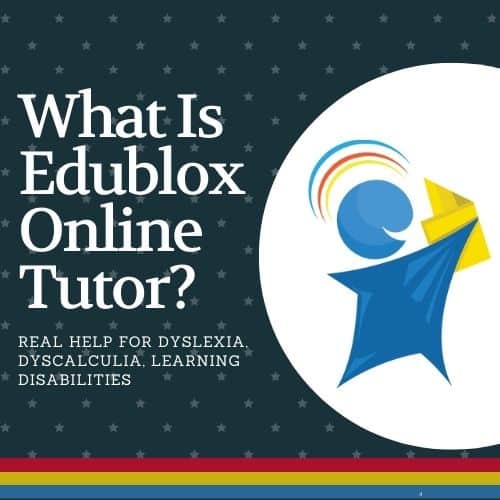
Quick read
Edublox is an educational method that integrates cognitive training with reading, writing, or math tutoring and solid learning principles. Edublox assists students in becoming life-long learners and empowers them to realize their highest educational goals. While Edublox is not a quick fix, its use can permanently alleviate the symptoms of learning disabilities like dyslexia and dyscalculia.
Full article
Edublox Online Tutor is an online platform that houses a range of products and services to improve various aspects of learning. Our programs include Development Tutor, Reading Tutor, and Live Tutor.
Development Tutor aims to improve general cognitive skills, while Reading Tutor aims to better cognitive skills, reading, and spelling. The exercises were designed to encourage regular and continuous learning, just like one would visit the gym regularly to improve overall fitness. Unlimited sessions are available per month.
Live Tutor offers four programs that target five academic areas:
- Reading and spelling;
- Spelling and writing;
- Reading comprehension; and
- Numeracy.
These tailor-made sessions are offered in conjunction with Development Tutor and recommended for students with mild to severe learning disabilities, including dyslexia, dysgraphia, dyscalculia (math learning disabilities), and poor reading comprehension..
What makes it different from other learning programs?
Our team has extensively researched learning, learning principles, and brain development, and created renowned learning tools used by parents, teachers, and in our clinics across the globe for 30+ years. Edublox Online Tutor embodies our combined knowledge and experience for the digital age.
What makes us unique?
First, Edublox Online Tutor addresses foundational learning skills and does not teach processes, strategies, or techniques. The difference between these can be explained by using basketball as an example. To be a basketball player, a person must first master the foundational skills, e.g., passing, dribbling, defense, and shooting. Only after that can he be taught strategies or techniques. Edublox Online Tutor aims at developing and automatizing the cognitive skills foundational to reading, spelling, mathematics, and learning, such as processing speed, working memory, and rapid naming.
Second, Edublox Online Tutor is aligned with best practices and the latest neuroscientific research findings. For example, Live Tutor’s reading and spelling program is based on the well-known Orton Gillingham approach but simultaneously develops the brain’s “visual word form area.”
Third, successful teaching depends not only on the WHAT but also on the HOW. For this reason, we adhere to learning principles..
How was Edublox developed? Does it really work?
Over the last 30+ years, the company behind the Online Tutor e-learning platform, Edublox, has helped more than 150,000 people in approximately 40 countries to read, learn, and achieve through home kits and learning clinics internationally.
Edublox started as a school readiness program with only a few cognitive exercises in 1979. Then, purely as an experiment, in 1980, the program was used for a learning-disabled child who overcame his learning difficulties. Over many years, in a quest to perfect the program and later programs, our team has extensively researched learning, learning principles, brain development, and neuroplasticity.
In October 2022, Edublox Online Tutor conducted an online benchmark survey to help us measure our performance as a business and the quality and results of our Live Tutor service. Forty-two percent of our clients — new and old, past and present — completed the survey. Our Net Promoter Score was 77 (excellent) compared to the educational industry average of 44 (great).
Our other 800+ documented successes include research from Singapore in 2014 with 27 Grade 6 students and a matching control group. The CEA in the Faculty of Education at the University of Pretoria analyzed the results, showing a statistically significant improvement in focused attention over five days (18 hours of training). Over and above, the effect size is large.
The experimental group in Dr. Jaidan Mays’s study showed an improvement of 1.3 years in visual memory and 1.5 years in visual sequential memory after receiving intensive Edublox training over five days (22.5 hours of training).
Dr. Lee DeLorge in Ohio tested 67 students aged 5 to 18 with ADHD, dyslexia, dyscalculia, and non-specific learning disabilities. The processing speed of 94% of the learners improved significantly:
- 35 ADHD students: 52.45% combined increase (37.24% pre-test avg/89.69% post-test avg);
- 13 dyslexic students: 46.76% combined increase (41.31% pre-test avg/88.07% post-test avg);
- 2 students with dyscalculia: 57.38% combined increase (39.76% pre-test avg/97.14% post-test avg);
- The remaining students were non-specific LD: 64.14% combined increase (30.40% pre-test avg/94.54% post-test avg).
.
A post hoc research project by Dawood confirmed that exposure to the Edublox program significantly improves processing speed. Sixty-four 2nd-grade students were divided randomly into three groups: group 1 completed 28 hours of Edublox’s Development Tutor for three weeks; group 2 was exposed to computer games, while group 3 continued with their schoolwork.
A study by De Wet found an increase in nonverbal IQ scores of 11.625 in deaf children after 27.5 hours of Edublox instruction, which was confirmed by our own trials of hearing children: an improvement of 5.6 in verbal IQ and 12.5 in non-verbal IQ after 40 hours of instruction.
Lastly, visit our reviews section for many testimonials and case studies of Edublox users worldwide, at various stages and for different needs: from improving the cognitive skills of children without learning difficulties to overcoming the symptoms associated with dyslexia, dysgraphia, and dyscalculia.
How long does it generally take to see results when doing Edublox?
While one usually starts seeing improvement within a few lessons, this improvement will not transfer to the student’s schoolwork immediately. This takes time.

When transfer occurs, it is usually sudden and noticeable. As an example, a mother who worked diligently for half an hour per day, six days per week, wrote:
I have a dyslexic boy who is now ten. He’s going into Grade Five. He usually ends his year with a fail in reading and writing. Since Grade Two, the school has wanted him to repeat his year. I have refused, promising to try to help him myself. We have been through many different programs (at school and home) with very little results.
We began Edublox about six weeks before Grade Four ended. His concentration has greatly improved; he actually listens to what the teacher is saying, less clowning in class. He can now actually pick up a book and read on his own, something he never did before. The principal called me to tell me that for the first time, my son passed all his courses! He got a C in reading and a B in writing!
This mother saw noticeable results after 18 hours (30 minutes per day, six days per week for six weeks). However, it can also take longer than 18 hours to start seeing results. Up to 30 hours is normal.
After this initial — and usually clearly visible — intellectual jump, the student finds themselves on a plateau again, followed by another leap forward. This pattern can repeat itself many times.

The above scenario could be described as a “staircase effect.” However, one may also see a “snowball effect:”
We began using Edublox (spelling program) 6 months ago, and the results have been just stunning. Within a month, she was able to remember how to spell a few words, and then just like a baby learning to talk, she began to experience a rapid snowball effect. A few months after we began using Edublox, she said as we were driving around on errands — “Mom, I think I know how to spell library.” And she did! And this was not an isolated moment, only the first. She is now almost an intuitive speller. Really, it’s a miracle. Six months ago, her spelling tested at a Kindergarten level and is now at a 6th grade level. This is just still so amazing to all of us who have struggled with her.
How long must one work with a student before their problems are solved completely?
One must ensure that a student’s problems have been solved completely before discontinuing the program. The minimum time required to achieve this is about one year, but it can take up to two years if the learner has severe learning problems (this naturally depends on the intensity of the program).
If one discontinues the program before the foundational skills of learning have been thoroughly automated, there is the danger of a relapse. On the other hand, once the foundational skills have been automated and the student is clearly no longer behind, the problem will not return if the program is discontinued.
The mother who wrote the above commentary continued with Edublox for an entire year. Three months after discontinuing the program, she wrote:
My son completed the Edublox program about 3 months ago. He did it for 1 year. I have written a few times stating all the changes that have happened since, but now I’d like to say that he is continuing to change. He has begun Grade 6 and has become very self-confident. He comes home from school and does his homework on his own. He organizes himself (something unheard of before Edublox). He asks me his schedule for the week, hockey or soccer practices, and organizes his homework accordingly. He no longer struggles in school to keep up and is adjusting to the increased workload. I am amazed at how far he has come. This time last year, he was failing reading and writing, he had a very low self-esteem, and basically thought he would struggle for the rest of his life. Not so!!!!!! It sounds too good to be true, but it isn’t. Sometimes the best things in life are so simple we almost miss them.
Sometimes it is helpful to gradually wean the student from the program rather than abruptly discontinue it. Once the student has overcome their difficulties, consider decreasing the number of minutes spent on each session or the number of sessions per week.
Remember that education is a process, not an event. Teaching a person to read takes time. There is no instant recipe for teaching reading, nor is there a quick fix to overcome a reading deficit. The same applies to spelling, writing, and math. Be patient!
Is Edublox Online Tutor intended only for children with learning difficulties?
Edublox Online Tutor is not exclusively intended for children with learning difficulties. One can also use it to improve the learning and reading abilities of children with no problems.
One should consider that we do not provide athletics training only to uncoordinated children. We take the talented ones, and through judicious training and exercise, we can turn them into great athletes. The same applies to the mental plane. If we take the talented, intelligent, and creative children and expose them to Edublox training, we can turn them into great “mental athletes.”
